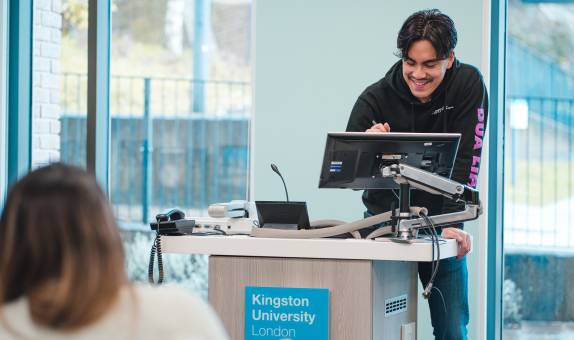Foundation Year in Business

Teaching Excellence Framework (TEF) Gold award
Our commitment to high quality teaching has been recognised with a TEF Gold rating. The University has received an overall rating of Gold, as well as securing a Gold award in the framework's two new student experience and student outcomes categories.
Why choose this course?
The foundation year in business is part of a four-year degree and is taught at Kingston College, close to Kingston University's Penrhyn Road campus. You'll be introduced to professional skills, numerical concepts, business IT, marketing, customer care and business law.
This foundation year is available with the following courses:
Choose your pathway
- Accounting and Finance BSc (Hons) including foundation year
- Business and Accounting BSc (Hons) including foundation year
- Business Management BSc (Hons) including foundation year
- Business Management and Digital Innovation BSc (Hons) including foundation year
- Business Management and Entrepreneurship BSc (Hons) including foundation year
- Business Management and Marketing BSc (Hons) including foundation year
- International Business BSc (Hons) including foundation year
- Marketing BSc (Hons) including foundation year
- Marketing and Advertising BSc (Hons) including foundation year
- Real Estate Management BSc (Hons) including foundation year
| Attendance | UCAS code | Year of entry |
|---|---|---|
| 1 year full time | UCAS codes are included on the relevant webpage for the course you would like to study | 2025 |
| Main Location | Kingston College |
Reasons to choose Kingston University
- A stepping-stone onto your chosen BSc degree course
- Prepares you with a foundation business knowledge whilst developing key academic skills
- You'll gain all of the benefits of being a Kingston University student
What you will study
The year-long foundation year is made up of four modules.
Foundation year
You will cover the professional and personal skills required for business; numerical concepts and IT skills of use in business; an introduction to marketing and customer care; and an introduction to the principal areas of English law that may be encountered in business
Core modules
Professional and Personal Skills for Business
30 credits
This module focuses on giving you a strong foundation of academic and transferable skills alongside your business modules. It also provides you with an opportunity to develop life-long learning and personal development skills. The module provides a bridge between the wide range of study experiences of students at Level 3 and the demands of successful study at Level 4. The early part of the module will develop the essential study skills needed to be successful on all the modules of the Foundation year.
As the module develops, you will start to evidence those skills also in the context of your future career and learn how to build your employability, both for your own self-awareness and for recruitment and selection activities you may face for placements and graduate employment. You will have the opportunity to apply your learning in a practical way, working as part of a group on a business projects and problems.
A wide range of both formative and summative assessment methods are used in the module. These include a portfolio of skills and a short capstone project culminating in a poster presentation which will use the skills developed in this module, alongside the subject material in other modules, to consider a topical issue related to your chosen degree pathway.
The personal tutorial system for the foundation year is incorporated within this module.
Applying Business Numerical Concepts
30 credits
This module provides the basics of mathematics, statistics and finance relating to business. This requires revisiting basic mathematics, basic statistics, basic use of spreadsheets (Microsoft Excel) and developing an understanding of some basic accounting concepts.
The module will be delivered using a problem-centric approach, emphasising the basic application of mathematical techniques and accounting concepts with a strong emphasis placed on the use of information technology to handle and process numerical data within a business context.
Introduction to Business Law
30 credits
This module will give you a general understanding of the principal areas of English law that may be encountered in business. There is an introduction to how business law is made. You will also be introduced to possible business liabilities under criminal and civil law, the main methods of resolving business disputes including the court system of England and Wales and alternative methods of dispute resolution. You will learn what constitutes an enforceable contract and what happens if one party fails to perform their part of the contract. You will learn some of the basic principles of employment law and the rights and responsibilities of employers and employees in the workplace.
Marketing & Customer Care
30 credits
This module provides you with an introduction to marketing and customer care. You will gain an appreciation of the core concepts in the field of marketing and customer care, and the module will enable you to apply this knowledge in your assignments. You will consider the role of marketing and customer service within different types of organisations (both non-profit and profit-making).
Future Skills
Knowledge to give you the edge
Embedded within every course curriculum and throughout the whole Kingston experience, Future Skills will play a role in shaping you to become a future-proof graduate, providing you with the skills most valued by employers such as problem-solving, digital competency, and adaptability.
As you progress through your degree, you'll learn to navigate, explore and apply these graduate skills, learning to demonstrate and articulate to employers how future skills give you the edge.
At Kingston University, we're not just keeping up with change, we're creating it.

Entry requirements
Teaching and assessment
Collaborative and group work activities are key components of the learning and teaching strategy in most modules of the programme; in some cases these provide opportunities for summative assessment. Effective group work is considered a vital skill for success, both within your intended degree routes and in the wider context of employability.
Who teaches this course?
You will be taught by staff at Kingston College. Their lecturing staff are well qualified and bring a wealth of current commercial experience to the programme, Lecturing staff with significant work experience will expose students to current business developments, whilst industry guest speakers provide additional opportunities to relate these to practice.
Why take a foundation year?
If you would like to study a business degree at Kingston University but are not yet ready to join the first year of a BSc (Hons) course then you may want to consider studying with a foundation year.
There are many routes onto the foundation year. It may be that you:
- are expecting to meet the entry requirements needed for the foundation year
- or may not have received the grades required for direct entry onto the first year of your chosen BA/BSc programme
- or you have been away from education for a period of time and would like an introduction back into study prior to taking your degree.
Whatever the reason, this option will prepare you for the transition onto your chosen degree programme.
Course fees and funding
Additional costs
Depending on the programme of study, there may be extra costs that are not covered by tuition fees which students will need to consider when planning their studies. Tuition fees cover the cost of your teaching, assessment and operating University facilities such as the library, access to shared IT equipment and other support services. Accommodation and living costs are not included in our fees.
Where a course has additional expenses, we make every effort to highlight them. These may include optional field trips, materials (e.g. art, design, engineering), security checks such as DBS, uniforms, specialist clothing or professional memberships.
After this course
Upon successful completion of this foundation year you will progress to Year 1 of your chosen degree programme.
Course changes and regulations
The information on this page reflects the currently intended course structure and module details. To improve your student experience and the quality of your degree, we may review and change the material information of this course. Course changes explained.
Programme Specifications for the course are published ahead of each academic year.
Regulations governing this course can be found on our website.






